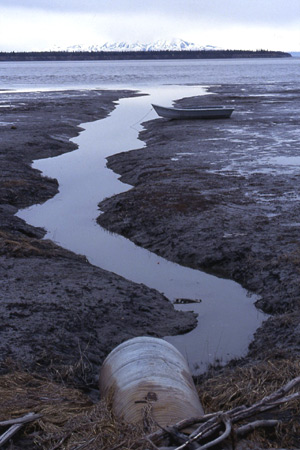WASHINGTON D.C.—A highly controversial plan to open up parts of Alaskas Arctic Wildlife Refuge (ANWR) for oil exploration has been approved by a narrow majority in the U.S. Senate (51-48) as a part of the budget Appropriation Bill.
An upcoming vote on November 7th in the House of Representatives will decide the fate of the Coastal Slopes of ANWR.
Drilling proponents have sought to open the Alaskan refuge to drilling for almost three decades, and President Bush made it a centerpiece of his 2001 energy plan. But for the last four years, the Senate blocked the effort. The 2004 election, which added four new Republican senators and ousted several anti-drilling Democrats, changed the political dynamic.
"It’s the beginning of the end of the opposition to drilling. I think we’re going to get it – finally. This giant resource is going to be developed, said Senator Pete Domenici, New Mexicos Republican senator, and chairman of the Senate Energy and Natural Resources Committee, to various US newspapers.
His sentiments where echoed by Alaskas Republican senator Ted Stevens, who said: development in the Coastal Plain will help lower energy prices, reduce our dependence on unstable and unfriendly regimes, and grow our economy.
But the vote was not without strong oppositon,
Betraying the promise of preserving the Arctic National Wildlife Refuge does not constitute a long term, sensible energy strategy in fact it does not even address our short term energy needs, said Maine’s Republican senator Olympia Snowe.
Gained energy will save pennies
Estimates by the Energy Information Administration (EIA), an independent office within the US Department of Energy (DOE), seem to support Snowe: Peak production in the ANWR which would be reached only by 2025 would reduce gas prices by merely one penny per gallon and reduce US reliance on foreign oil from 70 percent to only 66 percent within the same time frame.
The drilling plan calls for limiting the industrial footprint of development to 2,000 acres, but critics argue that pipelines, roads and other equipment are likely to be web out across the 1.5-million-acre coastal plain, taking up far more space than drilling backers estimate.
If the bill is passed, the Department of the Interior could begin selling oil and gas leases in the ANWR that would raise $5 billion over five years equally split between the US federal government and the state of Alaska.
Supporters of drilling in the refuge argue that the oil can be produced without harming the environment or the area’s wildlife. They also claim that development of oil and gas reserves would create thousands of jobs. The current energy market, with its higher oil prices and reduced refining capacity in areas affected by the Gulf of Mexicos recent run of devastating hurricanes, has made the passage of the budget amendment much easier.
Republican rebuttal—plus pork
Six Republicans —John McCain of Arizona; Snowe and Susan Collins of Maine; Mike DeWine of Ohio; Lincoln Chafee of Rhode Island, and Gordon Smith of Oregon—are joining forces with most Democrats in opposing the drilling.
Three Democrats supported the proposed drilling; Daniel Akaka and Daniel Inouye of Hawaii and Mary Landrieu of Louisiana. A $35 million rider for Hawaiian agricultural development attached to the bill on drilling ANWR seems to have swung the Hawaii Democrats to support the bill.
In a similar deal, Louisianas Landrieu secured a rider for $1.2 billion in additional relief efforts to rebuild after the state was devastated by Hurricane Katrina.
The squeak-through bill faced plenty more opposition.
Some Republicans not rejoicing
John McCain, co-sponsor of the Climate Stewardship Act, led the handful of Republican dissenters against the bill. On the whole, however, Democrats were outraged.
Senator Barbara Boxer, Californias Democratic senator and a long-time opponent of drilling, said of the vote, according to US news wires : "The Republican Senate has shown its true colors—it is clear by their overwhelming support for drilling in the Arctic National Wildlife Refuge that they have no respect for the environment."
Wisconsin Democrat, Senator Russ Feingold, said during debate over the measure Wednesday that: "This isn’t the way to make policy relating to energy. Drilling in the arctic refuge is something that has been, and should continue to be, discussed in an open debate instead of as part of a backdoor manoeuvre."
Environmentalists are still hoping that drilling in the refuge could be blocked if the bill is derailed during Congress’ complicated budget process. The House takes up its budget bill this coming week, and the two chambers will have to combine their separate bills in a joint conference committee.
Will the Senate and House reach accord?
But many Republicans are still anxious the ANWR drilling provision could complicate the passages of the bill by both the Senate and the House because it gnaws at other popular federal programmes—namely Medicare, Medicaide and student loan, all of which are in jeopardy as the House struggles to find $50 million in hurricane relief.
House Budget Committee Chairman, Republican Jim Nussle, of Iowa, told the New York Times Wednesday that he feared the drilling provision could kill the bill.
But other proponents say House leaders have lined up the votes they need, even though the vote is likely to be close.
"I think it will end up in the final bill, and it will end up on the president’s desk," said House Resources Committee Chairman, republican Richard Pombo, a leading proponent of developing the refuge. "It will be close. Budget reconciliation is always very, very difficult."
Svend Soeyland reported from Washington, DC, and Charles Digges reported from Oslo.




